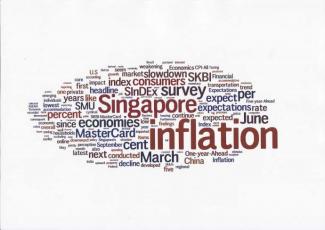
Singapore, 19 October 2015 (Monday) – Singaporeans’ One-year-Ahead inflation expectations have slipped to 3.23%, according to the research findings of the latest quarterly survey for Singapore Index of Inflation Expectations (SInDEx) by Singapore Management University (SMU).
Prolonged slump in global oil prices owing partly to oversupply and sluggish demand, as well as continued weakness in commodity prices, have had deleterious effects on global growth prospects. Exacerbating the global factors which is resulting in benign and almost negligible imported inflation, domestic factors such as continued decline in private transportation cost due to an impending supply boost in Certificates of Entitlement and additional supply of accommodation in the medium term might have also contributed in dragging the inflation expectations downwards.
The SInDEx, co-developed by Assistant Professor Aurobindo Ghosh of the Lee Kong Chian School of Business, is derived from an online survey of around 500 randomly selected individuals representing a cross section of Singapore households. The online survey helps researchers understand the behavior and sentiments of decision makers in Singapore households. The quarterly SInDEx survey has yielded two composite indices, SInDEx1 and SInDEx5.
In the latest and seventeenth wave of the SInDEx survey conducted in September 2015, consumers shared their views on expectations of inflation-related variables over the medium term (One-year-Ahead) to long term (Five-year-Ahead).
The results of the September 2015 survey showed that compared to June 2015, the One-year-Ahead headline inflation (or CPI-All Item inflation) has declined to 3.23% from 3.35% in June 2015. As a comparison benchmark, the median One-year-Ahead headline inflation rate, considered by many to be more representative and minimally affected by outliers, inched down to 2.92% in the September 2015 survey compared to 3.14% in the June 2015 survey.
Compared to the historical headline inflation expectations average of 3.94% and the more recent third quarter average of 3.48%, the current One-year-Ahead headline inflation is lower. The inflations expectations show that Singapore households are probably expecting weaker prospects of the global growth and domestic price pressures, and consequently expect overall inflation will be subdued.
Tracking the overall headline inflation, the One-year-Ahead Singapore core inflation expectations (excluding accommodation and private transportation related costs) also moderated down to 3.31% in September 2015 (from 3.5% in June 2015), its lowest level recorded since SInDEx survey started in 2011. However, significantly, for a subgroup of the population who own their accommodation and use public transport, the One-year-Ahead Singapore core inflation rate moderated down to 3.12% in the September 2015 survey compared to 3.38% in June 2015, its lowest level since June 2013. These respondents are possibly more informed about the Singapore core inflation rate as they don’t have to face changes on accommodation or private transportation costs directly.
One-year-Ahead Singapore Index of Inflation Expectations (SInDEx1), a composite weighted index of One-year-Ahead inflation expectations, moved down to match its lowest level of 3.26%, from 3.43% in June 2015. SInDEx1 is constructed as an alternative and more stable measure of inflation expectations by putting lower weightage on the more volatile and policy sensitive components like accommodation, private transportation, food and energy.
Assistant Professor Aurobindo Ghosh who is the Principal Investigator of the SInDEx Project observed, “This lackluster global growth forecasts has been outlined in IMF’s World Economic Outlook in October 2015 which attributed the decline in global growth for the fifth year in a row mainly to the slowdown in large emerging markets like BRIC countries and oil-exporting countries, despite a slight pickup in the advanced economies. This has also dampened imported inflation into Singapore.
“As highlighted in the last release of the SInDEx survey results, the delay in interest rate hike by the US Federal Reserve despite the comments by its Chair Janet Yellen that there would be a rate hike later this year might have signaled to the consumers that any such increase would be deliberate, benign and possibly more accommodative until global growth has normalised. In addition, domestic or pass-through price pressures, such as a tight domestic labor market which has an uplifting impact on wages, have been relatively benign in terms of increasing inflation expectations,” Prof Ghosh added.
For the longer horizon, the Five-year-Ahead overall (CPI-All Items) inflation expectations in the September 2015 survey moderated to 4.2% (from 4.37% in June 2015). The five-year-ahead median headline inflation rate, considered by many academics to be more representative as it is less affected by extremes, stood at 3.73% in the September 2015 survey, slightly lower from 4% in June 2015.
The Five-year-Ahead Singapore core inflation rate (excluding accommodation and private road transportation related costs) also inched down to 3.93% from 4.17% recorded in June 2015. The composite Five-year-Ahead Singapore Index of Inflation Expectations (SInDEx5) in September 2015 moved to 4.05% from 4.27% in June 2015, lower than SInDEx5’s historical average of 4.71%.
For more information, please contact
Teo Chang Ching (Mr)
Assistant Director
Corporate Communications
DID: 6828 0451
Email: ccteo [at] smu.edu.sg